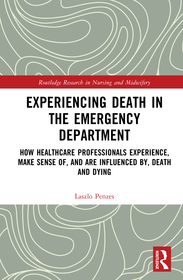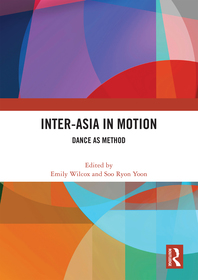
Experiencing Death in the Emergency Department
How healthcare professionals experience, make sense of, and are influenced by, death and dying
Series: Routledge Research in Nursing and Midwifery;
- Publisher's listprice GBP 145.00
-
69 273 Ft (65 975 Ft + 5% VAT)
The price is estimated because at the time of ordering we do not know what conversion rates will apply to HUF / product currency when the book arrives. In case HUF is weaker, the price increases slightly, in case HUF is stronger, the price goes lower slightly.
- Discount 10% (cc. 6 927 Ft off)
- Discounted price 62 346 Ft (59 378 Ft + 5% VAT)
Subcribe now and take benefit of a favourable price.
Subscribe
69 273 Ft

Availability
Not yet published.
Why don't you give exact delivery time?
Delivery time is estimated on our previous experiences. We give estimations only, because we order from outside Hungary, and the delivery time mainly depends on how quickly the publisher supplies the book. Faster or slower deliveries both happen, but we do our best to supply as quickly as possible.
Product details:
- Edition number 1
- Publisher Routledge
- Date of Publication 30 December 2025
- ISBN 9781032660899
- Binding Hardback
- No. of pages150 pages
- Size 234x156 mm
- Language English
- Illustrations 6 Illustrations, black & white; 6 Line drawings, black & white; 6 Tables, black & white 700
Categories
Short description:
This book draws on original research to illuminate how the personal values and norms of healthcare professionals in the Emergency Department (ED) influence how they experience the death of a patient, and develop tools and strategies to cope with these experiences.
MoreLong description:
This book draws on original research to illuminate how the personal values and norms of healthcare professionals in the Emergency Department (ED) influence how they experience the death of a patient, and develop tools and strategies to cope with these experiences. Experiencing Death in the Emergency Department begins by considering the nature of death in the ED; rather than planned and dignified, as part of a palliative or end-of-life care pathway, it is often abrupt and unexpected. Healthcare practitioners can be expected to ‘move on’ and function almost immediately after a death in this busy work environment, carrying the potential for emotional distress and psychological trauma.
Penzes investigates the psychological, emotional, social, and spiritual dimensions of death and how it influences the lives of those people who are directly involved, including the healthcare professionals looking after their patients. Presenting models of bereavement, he looks specifically at deaths in the emergency department, exploring what makes a death memorable, and how the patient can be objectified or humanised. A discussion of how the personal values and norms of practitioners helps them to make sense of deaths they’ve experienced is followed up with an exploration of the emotional labour of death and its impact on healthcare professionals’ behaviours, decisions and priorities, influencing their coping mechanisms, the care provided for other patients and even their career choices.
Arguing that developing emotional intelligence, self-awareness, and effective self-management of personal values is crucial in providing holistic care to patients and their families, this book is an important read for researchers and students from nursing, medicine, allied health, business studies and sociology. It is of particular value for those with an interest in grief and bereavement, trauma, workforce development and wellbeing, and emergency care nursing.
“A deeply moving and essential exploration of facing death in frontline emergency care. This book gives voice to unspoken emotional experiences of healthcare professionals, offering a deeply human perspective of loss, resilience and meaning making in the Emergency Department. It challenges us to reconsider how we support those who care for others in their most vulnerable moments. A must-read for anyone interested in the intersection of medicine, humanity and ethics.”
- Alison Ross, Head of Patient Experience (RN), University Hospital Southampton, United Kingdom
“This book offers an emotionally resonant and academically rigorous exploration of healthcare professionals’ experiences with death in Emergency Departments. Dr Laszlo Penzes brings rare insight, drawing on both scholarly research and lived experience, to illuminate the ethical, cultural, and human dimensions of end-of-life encounters in high-pressure clinical settings. Essential reading for anyone interested in the intersection of emergency care, professional identity, and the human condition.”
- James Wilson, Senior Lecturer in Nursing, University of Chichester, United Kingdom
“This concise and deeply human book explores the emotional, psychological, and moral toll of experiencing death in the Emergency Department. Bridging the gap between scientific palliative care literature and the self-help grief genre, it challenges readers to consider the hidden cost of care and the resilience required to carry on after delivering the worst news imaginable. A must read for all professionals working in emergency care.”
- Prof Julian Kause, Professor of Medicine, RCSI Medical University, Bahrain
“This book is an authentic, thought-provoking portrayal of what it means to care for others while confronting one’s own limits. It sheds light on the cultural complexities, social disconnection, and spiritual needs that emerge at the end of life. Ideal for readers who believe that effective healthcare begins with compassion and cultural respect.”
- Dr Matsikachando Moyo, Lecturer in Social Sciences and Nursing, Southampton Solent University, United Kingdom
More
Table of Contents:
Foreword, 1. Introduction, 2. Death and dying in a healthcare setting, 3. Death and dying beyond the biological dimension, 4. The complex process of bereavement, 5. Experiencing death in the Emergency Department, 6. Making sense of death in the Emergency Department, 7. The influence of death in the Emergency Department, 8. Conclusion: Life after death, Index
More






